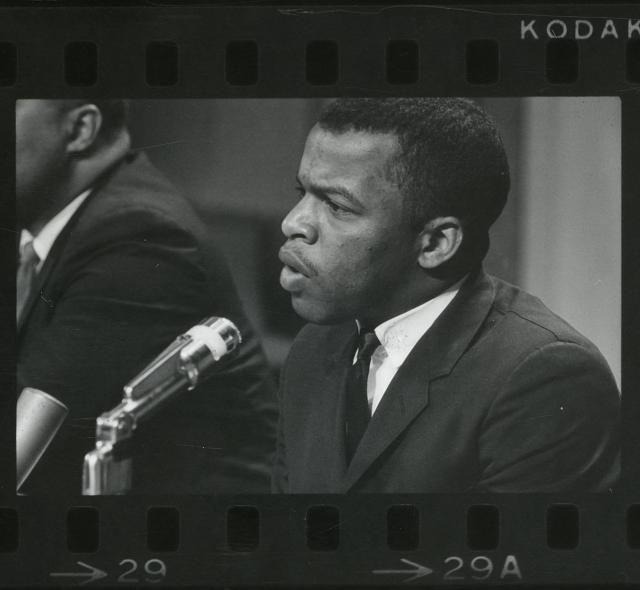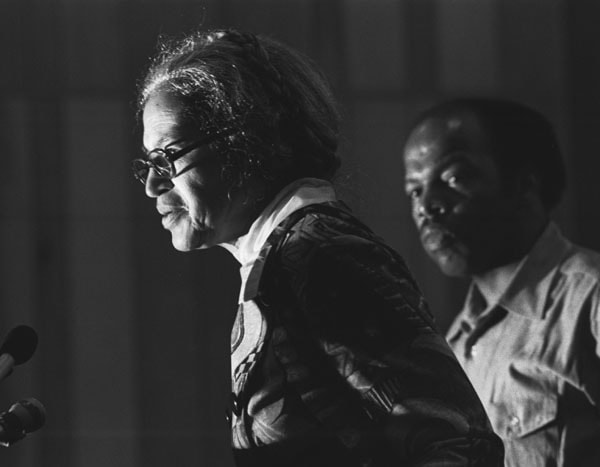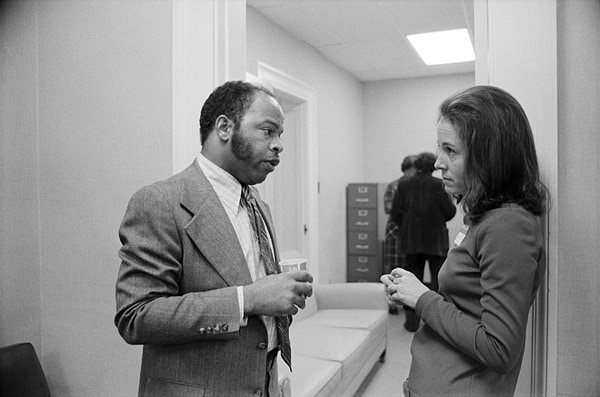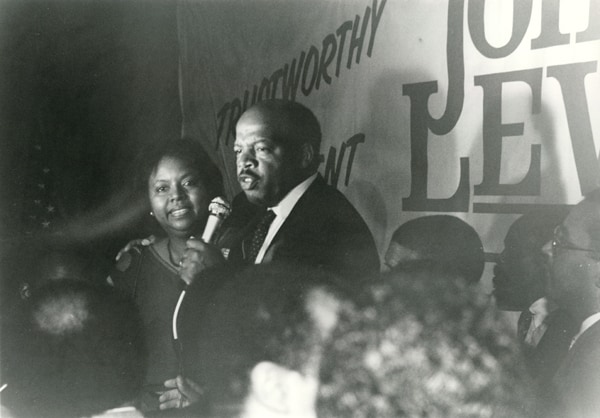
John Lewis speaking at a meeting of American Society of Newspaper Editors, Statler Hilton Hotel, Washington, D.C., 1964 | Library of Congress
After engaging in over 60 years of activism and service to the Atlanta community, prominent Civil Rights leader and Congressman John Lewis has died. As a passionate advocate for desegregation and social equity, Congressman Lewis initiated numerous efforts that helped propel the Civil Rights Movement into the national conversation and affect change in the areas that needed it most. Our country is built upon the stories of ordinary people like Lewis, who raised their head and hand and risked their lives to secure their rights and who today embody the way forward as we seek to grow into the preamble of the Declaration of Independence.
Born in Alabama, Congressman Lewis was the son of sharecroppers Willie Mae Lewis (née Carter) and Eddie Lewis. He and his nine siblings were raised on their family farm and educated at segregated and poorly funded public schools in Pike County, Alabama. When he was young, instances of activism like the Montgomery Bus Boycott and the speeches of the Rev. Martin Luther King, Jr. influenced his decision to get involved in the Civil Rights Movement.
In the 1960s, he bravely sought to reveal and confront the inherent discrimination in social and legal segregation measures. As his dedication to the cause grew, Congressman Lewis planned and carried out several sit-in demonstrations at segregated lunch counters in Nashville, Tennessee while studying at Fisk University. He also volunteered as one of the thirteen original participants in the Freedom Rides in 1961.
Following his activism as a Freedom Rider, Congressman Lewis served as chairman of the Student Nonviolent Coordinating Committee, or SNCC, from 1963 to 1966. As a founding member and chairman of the organization, he maintained the importance of engaging in nonviolent action and facilitated demonstrations that relied on peaceful civil disobedience tactics. Along with Whitney Young, A Philip Randolph, James L Farmer, Jr., Roy Wilkins, and Martin Luther King, Jr., Congressman Lewis became part of the coalition referred to as the Big Six Civil Rights leaders who represented major Civil Rights organizations and planned the March on Washington. At the time that he was elected to chair the SNCC, Lewis was just 23 years old.

John Lewis and Rosa Parks at an event in Atlanta, ca. 1970.
John Lewis helped orchestrate the 1963 March on Washington for Jobs and Freedom in the company of other Civil Rights leaders like NAACP president Roy Wilkins and Rev. Martin Luther King, Jr. Congressman Lewis delivered one of the day’s speeches from the steps of the Lincoln Memorial to a crowd of thousands. After taking part in the creation and performance of this historic event, the scale of his work and his involvement with the movement only increased.
In 1965, Congressman Lewis worked alongside Hosea Williams, the director of voter registration for the Southern Christian Leadership Conference and himself an influential Civil Rights leader. On March 7, 1965, the two led a group of over 600 peaceful protestors who sought to march from Selma to Montgomery, 54 miles across the state of Alabama, to direct national attention to the necessity of voting rights. Congressman Lewis, Mr. Williams, and the other marchers were met with intense violence, attacked by state troopers on what we recognize today as “Bloody Sunday.” Congressman Lewis himself was badly beaten by Alabama state troopers and suffered a concussion from a vicious blow to the head. Although it came at a high cost, the march itself and the cruelty endured by these nonviolent protestors captured the attention of the public and of lawmakers. The videos and photos that immortalized the violence of “Bloody Sunday” strengthened support for the passage of the Voting Rights Act of 1965, which was signed into law by President Johnson on August 7, 1965.
Congressman Lewis became the director of the Voter Education Project in 1970, where he was engaged in increasing voting registration and political action among eligible minority voters. He is credited with doing so very effectively, helping add nearly four million minority individuals to the voter rolls during his time with the organization.

View of John Lewis, head of the Voter Education Project, and Carol Muldawer, staff member for Congressman Andrew Young, in conversation, ca. 1973.
After two decades of striving to secure essential rights and greater livelihood for African Americans, he turned his attention towards improving the city of Atlanta. Congressman Lewis was elected to the Atlanta City Council in 1981, during which time he focused his efforts on maintaining the ethical standards of political office and preserving local communities.
His experience in city government helped garner him support on the federal level, and he was elected to Congress as the U.S. Representative of Georgia’s Fifth Congressional District in 1986. Since that initial election, Congressman Lewis continued to serve the state of Georgia and the city of Atlanta in that office until his death.

John Lewis speaking at a campaign rally in Atlanta.
He will be remembered not only as a Congressman and Civil Rights leader, but as a dedicated husband and father. His efforts to end segregationist measures and his contributions to the city of Atlanta speak to an enduring commitment to progress and humanity. His awards and commendations, including the Presidential Medal of Freedom, which was awarded to him by President Obama in 2011, honor his passion for achieving equality among all people. With such a profound legacy, Congressman Lewis will continue to serve our community well into the future. Congressman Lewis served as our north star of Justice and humanity.
Congressman Lewis and interviewer Dr. Calinda Lee
In November 2019, we were honored to interview Congressman John Lewis as part of our neighborhood initiative with Inman Park. Among many other things, including his towering career and national legacy, Congressman Lewis and interviewer Dr. Calinda Lee talked about his work with CAUTION, an Atlanta organization that protested and lobbied against the construction of major roads in historic neighborhoods during the 1980s.
His life’s work will continue to inspire us and thousands of school children each year, as his story is told in Addae Moon’s Walking Through the Valley: A Journey Towards Freedom, a central piece in our Museum Threatre series. It is our hope that by sharing his story, the next generations of Atlantans can continue Congressman Lewis’s work and ensure a just and equitable world for themselves.

